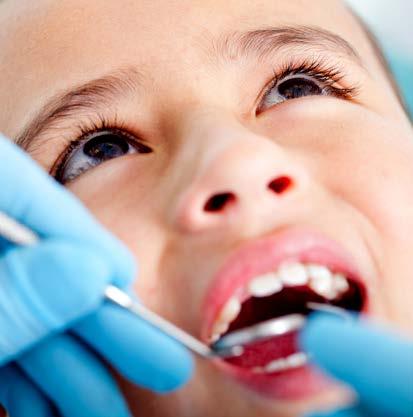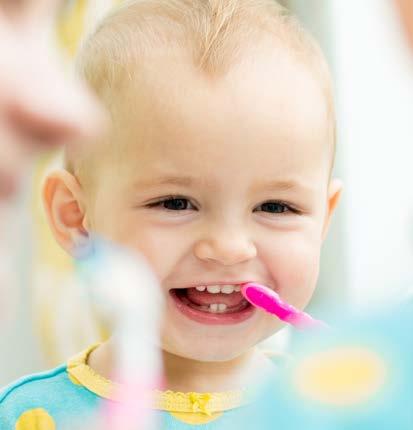
6 minute read
Smiley Faces
How to develop healthier and happier smiles for you and your family by the Oral Health Foundation
One of the most common features many of us are drawn to is our child’s smile. Not only does it help us to understand their emotional wellbeing, it’s also an important measure of their physical health too.
Advertisement
Keeping a child’s mouth healthy is vital. Teeth help them to chew and digest food, talk and pronounce different sounds clearly. Teeth also help to give their face its shape. This is why it is so important to give your child’s teeth the best care possible.
For this year’s National Smile Month, the Oral Health Foundation will be providing advice and support for taking care of children’s oral health. Pregnancy Bleeding gums is a common occurrence during pregnancy due to hormone changes, so more visits to the dentist and good oral hygiene are recommended. Take extra care with your oral hygiene routine, brushing twice a day for two minutes with a fluoride toothpaste and cleaning in between your teeth with interdental brushes or floss. Poor oral hygiene can impact foetal growth and development, so during pregnancy it’s even more important to take care of your oral health. You’re brushing your teeth for two!
Dental treatment is perfectly safe during pregnancy but inform the dentist before treatment that you are pregnant. You are also entitled to free NHS dental treatment, including check-ups and prescriptions, if you are pregnant or have given birth in the last 12 months. Babies and toddlers Expect teething to begin from around six months and last until all 20 baby teeth come through. Signs of teething include swollen or red gums where the tooth is coming through and the cheek on the side of the mouth where the tooth is appearing may also be red. Some children will experience disrupted sleeping patterns too.
If your baby or toddler drops a dummy on the floor when you’re out many parents will then lick the dirt off before giving it back to them. But when you do this, you’re passing on your saliva and potentially tooth-decay causing bacteria. There is a wealth of evidence to suggest that if you have poor oral health, there is a chance you can pass it on to your child so rather than sucking the dummy before you give it back to them, keep a bottle of water in your bag to rinse any dirt off instead.
It’s never too early to learn good oral hygiene habits. We want to build habits that last a lifetime and so the earlier you introduce toothbrushing to your child the more natural it will become, and the more likely it is that they will carry these habits into adulthood.
We recommend getting your baby used to the sensation of toothbrushing as soon as possible. You may find it easier to stand or sit behind your baby, cradling their chin in your hand so you can reach their top and bottom teeth more easily using a small smear of children’s toothpaste to clean them. Use a small-headed soft toothbrush in small circular movements and try to concentrate on one section at a time.


Supervise your children’s brushing until the age of seven and make sure they don’t accidentally swallow any toothpaste. Children’s toothpaste will have a lower concentration of fluoride and a milder flavour, so we recommend using ageappropriate toothpaste. Dental visits As they grow up, children are constantly subjected to change and new experiences occur on a daily basis. And just like their first tooth, word, step, haircut or birthday, their first visit to the dentist is a significant milestone.
Going to the dentist should be a regular part of every child’s life in order to keep an eye on their oral health and increase familiarity with the dental practice. By introducing the child to the dentist at an early age, it will help them become accustomed to the sights, sounds and smells of the dental practice. By creating good habits in childhood, such as visiting the dentist regularly, they are far more likely to continue them into adulthood. Diet Children aren’t born with a sweet tooth; they develop it by exposure to sweet treats through parents and advertising. This is why we supported the proposed junk food advertising ban to limit the number of images of junk food children are exposed to and the introduction of the sugar tax.
It’s not realistic to expect children to give up sugary foods and drinks entirely, but we believe education starts at home and that parents can help their children make informed choices about the foods they eat.
The main point to remember is that it is not the amount of sugar a child may eat or drink, but how often they have it. Try to keep sweets to mealtimes and encourage children to choose snacks and drinks that are healthy for their mouth and teeth such as cheese, raw vegetables, seeds, bread, crackers, breadsticks, and fruits. Milk and water are the healthiest drinks for your mouth, so fruit juice, squash and fizzy drinks should be avoided or kept to a minimum.
By caring for their teeth and giving them little bits of information whilst they are young, your child will develop good eating and tooth-care habits into adulthood. Dental Buddy The Oral Health Foundation has created a brandnew online resource for anybody looking to help children understand more about the health of their mouth. Dental Buddy provides Early Years, Key Stage One and Key Stage Two training modules, presentations and worksheets for children so they can learn how to look after their mouth and why it is so important.
All Dental Buddy materials can be downloaded for free at www.dentalhealth.org/dentalbuddy For more information, visit www.smilemonth.org or email helpline@dentalhealth.org if you would like some advice from their dental advisors.
Punch & Judy
For over 70 years, Punch and Judy has been a British Brand with a place in the hearts and mouths of generations. Kids love the flavours and parents love winning the brush-time battle. And now there’s even more reason to love Punch and Judy with a new natural toothpaste range and child-and-planet friendly bamboo toothbrushes. Available at leading retailers and online at punchandjudykids.co.uk





















